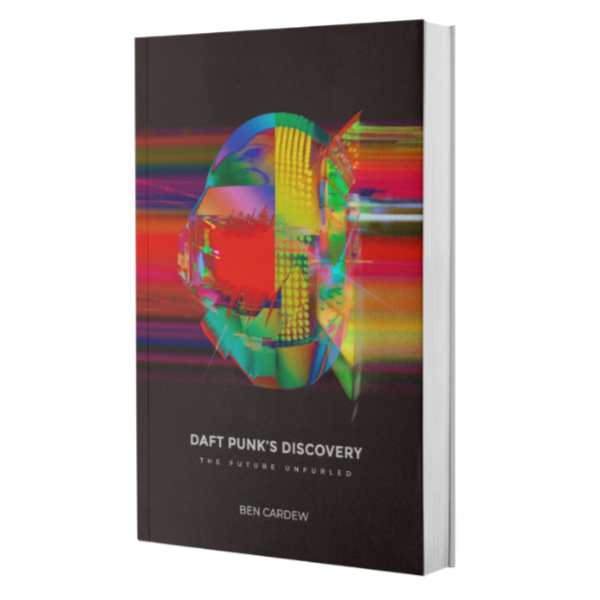Our forthcoming book Daft Punk’s Discovery analyses the French duo’s second album. Discovery was a record that confounded many fans when it was released in 2001, thanks to its blatant pop hooks and unlikely sonic bricolage. It was a record that was – and still is – widely misunderstood; Discovery’s impact has only become clear with the passing of time, as Daft Punk have been proved right time and time again. Here author Ben Cardew explains how he came to write the book and what to expect.
Daft Punk are not a band that needs a lot of explaining. And yet they are a band who can be endlessly explained.
Daft Punk records are not difficult, obtuse or particularly mystical. You can dance to them with a light heart and an untroubled mind, without fretting over theoretical concepts of sampling and the lingering traces of dance music history.
At the same time, there is a lot you can say about Daft Punk and in particular, their second album, Discovery, which is the subject of my new book: Daft Punk’s Discovery – The Future Unfurled.
There are many reasons why I decided to write a book about Discovery. It is a magical record that makes me laugh and cry; one of my favourite albums of all time and it celebrates its 20th anniversary this year. More important than all that – at least from a writer’s perspective – is the fact that Discovery fascinates me on so many levels.
On a purely musical level, Discovery’s mixture of disco, pop, house, soft rock and baroque melody is extremely unusual. Discovery is one of those rare records that I remember hearing for the first time: I recall taking the CD home, putting it on, eagerly, and the sensation of pure what-the-hell-just-happened? as Aerodynamic spiralled down a heavy metal hole.
Discovery is also vitally important as a cultural touchstone. It’s been called the most influential album of the last 20 years for the way it influenced the 21st Century pop sound; and you can also see its influence in everything from download stores to social media, the visual album to EDM.
At the same time, I think Discovery – and Daft Punk themselves – are rather misunderstood. Daft Punk bear the reputation of mythical gods of dance music, who never showed their faces, even as the world’s music fans fell at their feet. Which is kind of true. But at the same time, they’re two rather geeky men from a bourgeois part of Paris, who used to show their adolescent faces all the time. And Discovery, for all its later acclaim, was hated as much as it was loved on release.
I wanted to explore all this in my book, not to destroy the Discovery myth but to enhance it. Peeping behind the curtain of Discovery, for me, only makes me love the album more.
And this leads me to why I feel somehow justified in writing a book about Daft Punk. To be clear, Unfurled isn’t authorised by Daft Punk and I didn’t interview them for the book. I managed to speak to their manager briefly, we arranged to talk again and then Daft Punk split up and the trail went cold.
But this is no quick, post-split cash-in of a book. I started writing in summer 2020 and I started thinking about this book at least two years before that.
Writing Unfurled is the culmination of my long history with Daft Punk’s music. I first encountered the band in 1995; I reviewed their debut album in 1996, and in 1997 I saw Daft Punk play the Daftendirekt tour in Manchester and at the Glastonbury Festival.
As a keen Francophile, I lived in Paris from 1997 to 1998, and 1999 to 2000; and in 1999 I saw Daft Punk support Basement Jaxx in Paris, DJing to an almost empty dance floor. Many years on, I interviewed Thomas Bangalter for Promo magazine, talking about the band’s filmmaking.
So, in my own (very) little way, I was present during some of the key moments in Daft Punk’s career. I remember what those early, frantic gigs were like; I can recall the initial horror over the Autontuned sound of One More Time.
I’ve approached this book with journalistic rigour. I’ve worked as a journalist for almost 20 years and I have tried to make sure that all the information in Unfurled is properly sourced, not always the easiest thing when you’re dealing with Daft Punk.
I’ve spent hours interviewing key characters in the Discovery history; I’ve discovered new things about the band; I’ve dug into hundreds of interviews with Thomas and Guy-Man, including previously unreleased interview material; and I’ve called on my own experiences in and around the world of Daft Punk.
This adds up, I think, to a book that is serious in its intent, without ever dimming the magic of Discovery.
For me, there is no doubt that Discovery deserves its own book. And I have given my all so that Unfurled may, in some way, be worthy of an album that has marked my adult life.
In September, when the book arrives, I hope you will agree.


